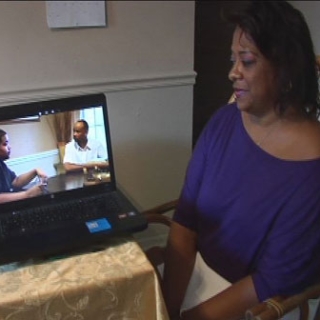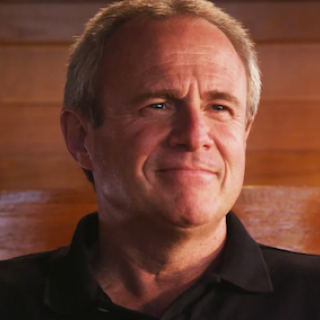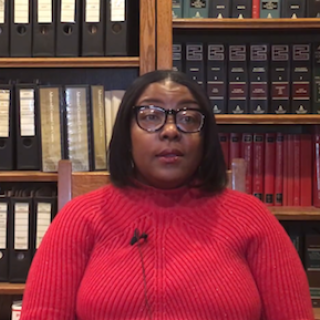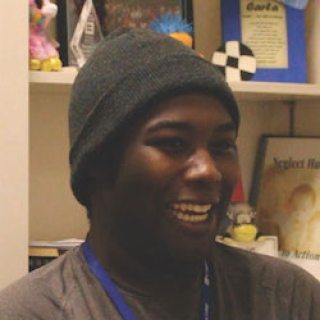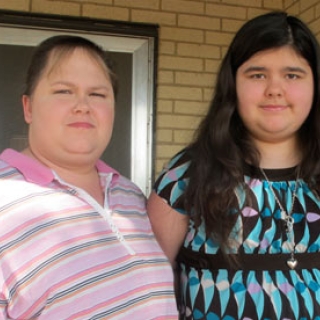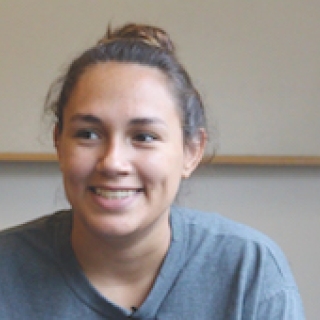
Our Impact
Our Impact
Our work has shaped hundreds of laws and positively affected millions of Texans by breaking down barriers through transformative policy solutions.
Key Accomplishments in Our Project Areas
Explore these areas of our advocacy work.
Our Path To Justice
Texas Appleseed advocates at the state and local level for fair, just, and equitable laws. Our work has shaped hundreds of laws and positively affected millions of Texans by breaking down barriers through transformative policy solutions.
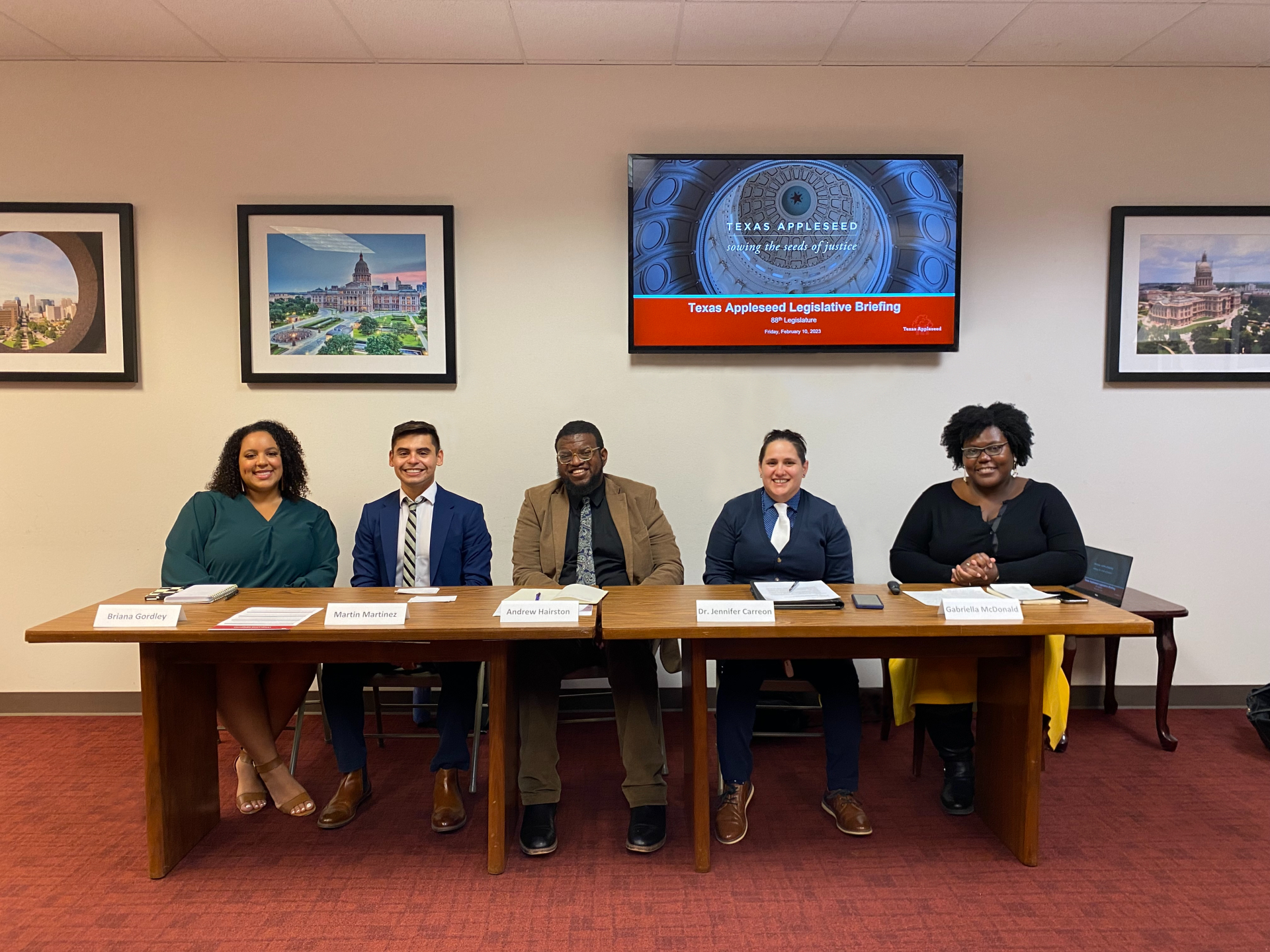
How We Work
- Public policy advocacy in the Texas Legislature
- Influencing policies and practices in Texas’ state and local agencies and school districts
- Working with cities and counties to pass strong local ordinances
- Partnering with local communities and organizations to provide policy and technical expertise
- Targeted legal action, including litigation
- Training judges, lawyers, and others in best practices
- Working with businesses to change market practices

Major Awards
- Best Place for Working Parents, Austin Business Journal, 2025
- Consumer Champion Award to Ann Baddour from the Consumer Federation of America, 2024
- Best Place to Work, Austin Business Journal, 2024
- Best Place for Working Parents, Austin Business Journal, 2024
- Community Recognition Award, from the Community Advancement Network, for advancing fair housing, 2018
- Light of Justice Award from Texas Defender Service, 2013
- Excellence in Public Interest Award to Deborah Fowler from Texas Law Fellowships, 2011
- Ma’aT Justice Award to Deborah Fowler from Women & The Law Section of the State Bar of Texas, 2011
- Impact Award in Poverty Law to Maddie Sloan from the State Bar of Texas Poverty Law Section, 2011
- Best of the Best Award to Ann Baddour from El Paso’s Invest in the American Dream Initiative, 2009
- Education Research Award from the Texas Association on Mental Retardation, 2006
- Pioneer Award to Ann Baddour from the Texas New Alliance Task Force, 2005
- Ring of Honor Award from the Mental Health Association in Texas, 2003
- W. Frank Newton Award from the State Bar of Texas, 2002
Stories of Our Work
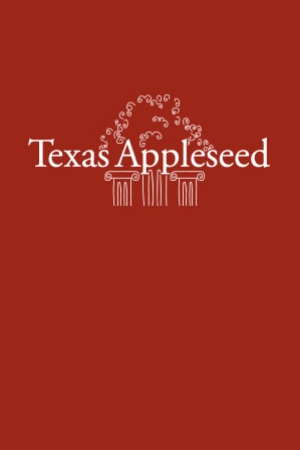
Roslyn’s Story
Roslyn applied for assistance shortly after Hurricane Ike caused major damage to her Houston home in 2009. She submitted the proper paperwork and was interviewed several times by Houston’s Housing and Community Development Department, but years went by and Roslyn was still waiting for help. Mold had begun growing in her home, and small openings in the walls had become large enough for small animals to enter. Contributing to the delay was the city’s initial decision to put almost all of the federal block grant disaster relief monies earmarked for housing into multi-family units. Initially, fewer than two dozen single-family homes damaged by Hurricane Ike were on Houston’s list for repair or reconstruction. Texas Appleseed has worked at the federal, state and local levels to ensure that low-income homeowners receive federal assistance to rebuild after natural disasters strike. As a result, the city agreed to put more disaster recovery funds into single-family housing — and Roslyn’s home is now rebuilt.
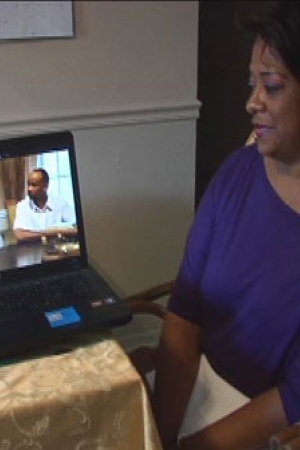
Marjorie’s Story
When Marjorie Holman’s 12-year-old son received a Class C misdemeanor ticket in 2012, at his Bryan, Texas, middle school for Disruption of Class, she couldn’t believe it. “The idea that the school was treating children like criminals for this kind of kid stuff was just crazy to me.” She ended up paying a fine, and her son was given probation, 20 hours of community service, and was required to attend a first-time offender program — in addition to three days of in-school suspension. When Ms. Holman called Texas Appleseed, we investigated and discovered that while African-Americans comprise less than 25 percent of the Bryan ISD student body, they received more than half of all tickets for the low-level offenses of Disruption of Class and Disorderly Conduct. In 2013, Appleseed filed a complaint with the Department of Education Office for Civil Rights (OCR) alerting them to the unlawful practices in Bryan, and the OCR is investigating. Our years of research and reporting on Texas’ school-to-prison pipeline also contributed to state lawmakers’ decision to end misdemeanor ticketing in public schools in 2013.

Edna’s Story
Edna (not her real name) from Rowlett, Texas, used a money transfer service to send funds outside the United States. In 2013, when she found herself the victim of a scam, she had somewhere to register a complaint thanks in part to Texas Appleseed. Our years of research, reporting, and expert testimony on best ways to provide oversight and transparency in international remittance transactions (including pricing) are reflected in new rules adopted by the federal Consumer Financial Protection Bureau. In this case, the Bureau helped Edna get monetary relief — and continues to provide consumers like her with an advocate when remittance transfers are not handled as promised.
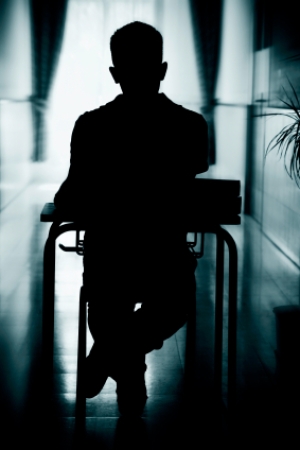
Ben’s Story
Once Ben (not his real name) was committed to the Corsicana Residential Treatment Center 2009, his “treatment” experience was poor. He saw at least five caseworkers come and go in this state secure facility for young offenders, and his medications were frequently interrupted or changed. Without consistent supports and mental health services, Ben was stuck at stage one of a five-stage release program for years. Appleseed worked with Ben’s lawyer at Disability Rights Texas and the National Center for Youth Law to publish a report focusing on the problems associated with the lack of treatment and support services at Corsicana, advocating for closure of the facility and re-direction of state resources to community-based alternatives. We also called on the Department of Justice to investigate lack of mental health treatment in juvenile secure facilities. Today, the Texas Juvenile Justice Department has moved all youth out of the Corsciana facility to another placement, citing the agency’s desire to ensure safety and adequate treatment. The agency is looking at long-term solutions to ensure that youth like Ben receive the treatment and support they need.

Andrew’s Story
Andrew (not his real name) has serious emotional disabilities and resided in an institutional treatment facility. Who is looking after Andrew? It is a huge responsibility to ensure that the State of Texas, in its role as “parent,” is providing a safe, caring environment that meets the physical and emotional needs of our foster children. That is why every foster child’s case is overseen by a judge. At a 2013 summit to share “best practices” on how courts can help foster children, one Texas judge said he is now persuaded that it is critical that he, and judges like him, see and hear from children to best determine if they are receiving good care. That was true in Andrew’s case: When Andrew’s placement in a residential treatment facility prevented him from going to court, this judge used videoconferencing to see the boy. When Andrew appeared “overmedicated,” it triggered a review to see if the boy should be placed elsewhere. What is persuading this judge and others to change their court practices in foster care cases? Best practices recommended by both the state’s Supreme Court’s Children’s Commission and Texas Appleseed’s reporting on foster care and the courts.

Jesus’ Story
On his 2013 application to our Diversity Legal Scholars Program, Jesus described his difficult childhood: born into poverty, raised by a single grandmother in public housing, both of his parents struggling drug addicts who frequently moved in and out of jail. Yet, Jesus managed to become the first in his family to graduate from high school and then, from college. Now he wants to be the first in his family to graduate from law school, but he needed to be accepted first, and that’s where Texas Appleseed could help. We awarded him a scholarship to cover the full cost of a Law School Admissions Test (LSAT) review course offered by Kaplan Test Prep. We have also found Jesus a practicing attorney to mentor him along the way — and we predict Jesus will make the legal profession proud.

Cameron’s Story
When Cameron’s pro bono counsel contacted Texas Appleseed in early 2009, the 16-year-old was in solitary confinement in the Harris County jail. He was certified to stand trial as an adult even though his evaluation by a forensic psychiatrist described him as having “little inclination toward violence” and a thought process that “lack(ed) sophistication” and was “indicative of immaturity.” After reviewing the record, Texas Appleseed filed an amicus brief on Cameron’s behalf, with pro bono help from attorney John Vernon with the Vernon Law Group. Vernon’s research showed that more than 93 percent of the motions in Harris County to certify juveniles as adults were approved over a 10-year period, suggesting that the process had become little more than an “assembly line” and out of step with the thoughtful review required by Texas law. In July 2013, after a long and arduous journey through the court system, Cameron’s certification was reversed — the first certification of a juvenile to be overturned in Texas in a quarter century! The appellate court issued an opinion that not only corrected the erroneous decision in Cameron’s case, but also corrects missteps in previous case law and provides a clear directive to juvenile courts to consider all statutory factors before certifying a youth to stand trial as adult.

Michael Morton’s Story
It is a tragedy: the wrongful conviction of an innocent man that could have been prevented if prosecutors had shared exculpatory evidence with his defense attorneys during pretrial discovery. After spending 25 years behind bars, Michael Morton attracted considerable media attention in 2012 when DNA and other evidence cleared him of murder charges. Texas Appleseed and pro bono attorneys from Locke Lord LLP researched and reported on the wide range of criminal discovery practices in Texas in the months following Morton’s release — recommending ways to reform and uniformly apply the State’s criminal discovery statute. Our report framed the debate and successful passage of the Michael Morton Act in 2013 to protect Texas residents from this kind of injustice. Michael Morton, now free after so many years, has become an effective advocate on innocence issues, and is working to rebuild his life.

Marta’s Story
Marta (not her real name) had used payday loans in the past. In 2013, when she needed extra money, she had a new option available to her through her employer in Brownsville — a fully amortizing loan at 18 percent interest. She got the money she needed at an affordable price and with one year to pay it back in small installment payments. Having the loan, offered through the Community Loan Center, gave her “peace of mind.” Texas Appleseed is working with the Community Loan Center, the Texas Association of CDCs, and RAISE Texas to make this loan program available to moderate-income employees across the state. Each loan is a $700 savings over a payday loan. It is affordable, meets borrower needs, and helps them build positive credit for the future.
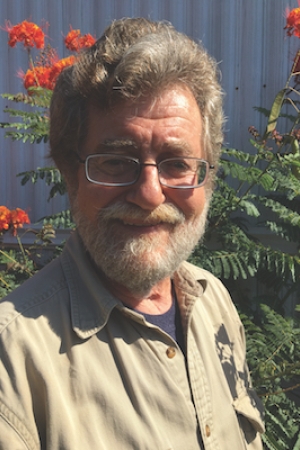
Larry's Story
Larry is in his late 60s. He loves his home, a small trailer in Austin with a beautiful garden, and his dog, who is his constant companion. A decade ago, he was earning a good living when he unexpectedly lost his job. Credit card debt that had been manageable suddenly became impossible to repay. Debt collectors started calling and writing, and he became scared — particularly when one made it sound like they could take his home. One letter he received said, “Congratulations on paying off your mobile home. You owe us $680.” The letter terrified him because it led him to believe that the debt collector — collecting on his credit card debt — could take his home. His case worker at Family Eldercare referred him to Texas Appleseed. “Appleseed gave me all this information,” Larry reflected. “I learned that my home is my home, and it is untouchable. No one can take it…that was just a big relief.”
Texas Appleseed is working to curb unfair practices in the debt collection process — such as harassment and wrongful threats — and to ensure Texans know their rights under federal and state law. We will debut an online toolkit in 2018 to explain Texans’ rights and provide tools for self-representation when people can’t access an attorney.

Lauren’s Story
When Truancy Charges Involving An 8-Year-Old Ignore Family Challenges
Read More

Lauren’s Story
Lauren (not her real name) is an eight-year-old Dallas elementary school student who has mental and physical disabilities. Her single mother has two children, few financial resources, and relies on the kindness of friends and neighbors to transport her and her daughters to doctors’ appointments, the grocery and school meetings. She dutifully sent doctors’ notes to the school when Lauren was ill and missed school, but many were never logged into the school’s electronic attendance system. In 2013, when she found herself facing large fines and a court date, this mother contacted Disability Rights Texas, and they contacted us. Texas Appleseed reached out to The Vernon Law Group, PLLC, to take her case pro bono. Not only were the case and fines dismissed, but her pro bono and Disability Rights attorneys exposed the school’s failure to provide Lauren with adequate accommodations for her disability. Now Lauren is getting more of the help she needs to succeed, rather than fines that pile on new obstacles for her struggling family. And in 2013, the Texas Legislature passed a law prohibiting court action against elementary school children for missing school.
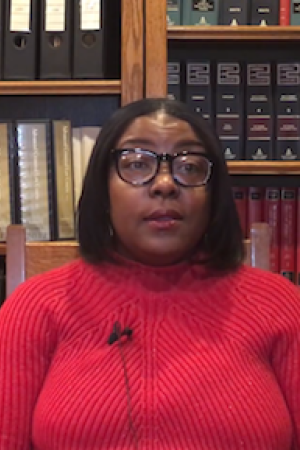
Janet's Story
Janet had a soft spot for stray and abandoned dogs. She was fostering four of them and later received a noise violation ticket because of their barking. Ultimately, Janet received 18 tickets related to the dogs barking. The total fines associated with the tickets totaled more than $5,000. Janet told the judge she couldn’t afford to pay everything at once. She filled out a form showing that her expenses were more than her income. But when she asked if she could do community service to pay off the tickets, the judge refused, telling her she had to “pay it or lay it.” In other words, if she couldn’t pay off the tickets, she would have to “lay out” the fines in jail, one day for every $100 she owed. Janet spent 52 days in jail.
Texas courts have routinely failed to ask about defendants’ ability to pay fines or costs, or to offer them alternative sentences like community service. Texas Appleseed’s report, Pay or Stay, co-authored with the Texas Fair Defense Project, became a go-to resource for state legislators seeking to end debtors’ prisons in the Lone Star State. On September 1, 2017, two new laws went into effect that will help Texans resolve fines through alternatives such as payment plans, waivers, and community service; thereby reducing the number of people jailed.

Ariane's Story
The Financial Setbacks & Traps that Predatory Lending Causes in Texas
Read More

Ariane's Story
Ariane is no stranger to challenges. She moved to Houston with her family 12 years ago after losing everything in Hurricane Katrina. After making great strides towards rebuilding her life, she lost everything again because of Hurricane Harvey. “God gives the toughest battles to the strongest warriors,” she reflected.
Between the two hurricanes, she experienced another setback. She took out an auto title loan in a particularly desperate moment — a relative passed away and she took in the children who were left without a mother. She borrowed money from an auto title lender, secured by her car, and owed the full amount of the loan plus a 40 percent fee in just one month’s time. Under Texas law, this usurious lending is legal, and Ariane almost lost her car.
She was able to fight back because her vehicle was repossessed in an abusive manner, and the lender could not produce a valid contract. Texas Appleseed explained her options and helped her understand her rights. “You have empowered me to do what I am doing. This unjustness and unfairness generation after generation is infesting our neighborhoods.”
More than 40 cities in Texas have passed a unified ordinance that reins in the worst abuses of this industry, covering more than 9 million Texans. Texas Appleseed has also promoted market alternatives to payday and auto title loans. One of these has already saved Texans more than $14 million in fees and interest.

Cody’s Story
Cody (not his real name) was a teenager who had been living with disabilities in the foster system for most of his life, and his foster family wanted to adopt him. Unfortunately, if they completed the adoption, he would lose the benefits that helped pay for services related to his disability, and his family couldn’t afford the cost to continue them. In 2011, the foster care judge overseeing his case began following our recommendations on bringing the child and stakeholders to court for regular hearings, and heard about the obstacles first hand. Now knowing the actual obstacle, she was able to cut through the red tape and order a continuation of benefits even with adoption. Cody has now been adopted into the first stable home he has ever had, and is getting the help he needs.

Juanita’s Story
Juanita (not her real name) lives in a colonia in Cameron County near the Texas-Mexico border. Her unincorporated neighborhood is low-income, and her home flooded every time it rains hard. When Hurricane Dolly hit, her colonia was quickly underwater. But because of work of Texas Appleseed and our partners, in 2012 the local council of governments agreed to use a portion of their federal disaster relief block grant allocation to extend drainage improvements to the colonias. Now Juanita’s house will remain safe and dry during South Texas rains.
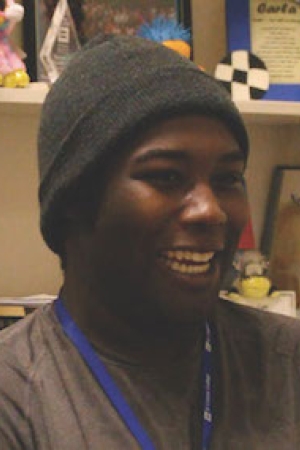
Toni's Story
Toni is a soft-spoken college student who can say he is finally happy in life. He entered foster care when he was 16 years old, and he first became homeless when he aged out of care at 18. He was in foster care because of behavioral issues. He felt that everyone hated him because he was gay, and he wanted to kill himself.
His first experience with homelessness lasted six months, and he’s been homeless on four to five different occasions since turning 18. When we asked about how he knew where to go initially, he said this about the homeless shelter in his area: “I had volunteered there before, and I … took people that were, like, homeless there … but I never thought in a million years it would happen to me … until it actually did.”
He eventually moved to Dallas to seek better services than what was available in his hometown in West Texas. In Dallas, he got connected with TRAC, a program that assists youth leaving the foster care system. “This program honestly saved my life,” he reflected. “I could not be more grateful that there’s programs like this. I just couldn’t imagine how it would be if they didn’t have programs like this for youth or people that are at risk that need help.”
He had been in an apartment for two weeks when we met with him, and he now has stability in his life. “I’m there, and I’m happy for once in a long time.”
Texas Appleseed is working to equip homeless youth with knowledge of their rights and responsibilities. We’ve done that through our Texas Homeless Youth Handbook, which will be continually updated as laws and policies evolve. We are also advocating for this population of young people by looking at the systemic problems that contribute to youth homelessness and presenting policy recommendations that can change Texas’ path for the better. These findings, insights, and solutions are presented in our policy report: Young, Alone, and Homeless in the Lone Star State: Policy Solutions to End Youth Homelessness in Texas.
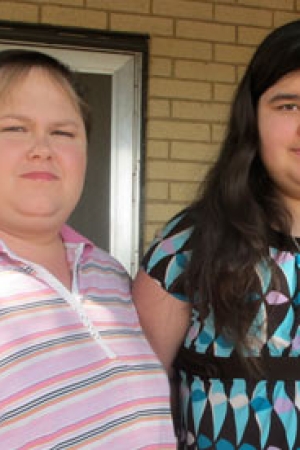
Sarah’s Story
We first became aware of Sarah’s receiving a ticket at school through her attorney at Disability Rights Texas. Sarah told us she had been repeatedly bullied through elementary and middle school. On this particular day, she applied perfume in her 7th grade math class after other students accused her of “smelling bad.” This led to more teasing from her classmates, frustrating Sarah’s teacher who was trying to keep the class focused on their work. Sarah was sent to the office where she was ticketed for Disruption of Class and sent home from school. Cases like Sarah’s motivated Texas Appleseed to push for the elimination of Class C misdemeanor ticketing in Texas schools — and in 2013, the Legislature did just that!
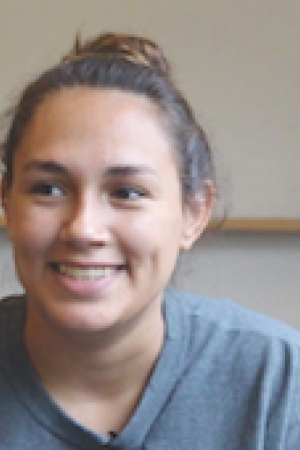
Madison's Story
Madison’s mother kicked her out of her home at age 16 over an argument. She bounced from friend’s house to friend’s house for nearly two weeks before CPS intervened and placed her back into care. When we met Madison, a quiet girl from Austin, she had spent a year between two different shelters, Austin Children’s Shelter and Lifeworks. From age 16 to 18, she had been without a permanent address three to four different times and had seen 12 to 13 different CPS caseworkers. Madison said the hardest thing about being homeless was “trying to find a stable place and going to school.”
School is important to her. She finished high school and was headed to study at the local community college. “I am hoping to do vet medicine. We had classes at my school all the time, and we got to work with lambs and goats. I just love working with animals.”
Madison has missed out on a lot of the support and caretaking one expects from a loving parent or family, while she takes time to remain connected to her younger siblings who reside with their father. With little parental guidance, one of the things she wishes she had learned was “financial handling” as she put it — knowing how to do things like taxes, understand credit, and manage a bank account. She is making her way despite her obstacles. In five years she hopes to have her own place and finish school.
Texas Appleseed is working to equip homeless youth with knowledge of their rights and responsibilities. We’ve done that through our Texas Homeless Youth Handbook, which will be continually updated as laws and policies evolve. We are also advocating for this population of young people by looking at the systemic problems that contribute to youth homelessness and presenting policy recommendations that can change Texas’ path for the better. These findings, insights, and solutions are presented in our policy report: Young, Alone, and Homeless in the Lone Star State: Policy Solutions to End Youth Homelessness in Texas.
